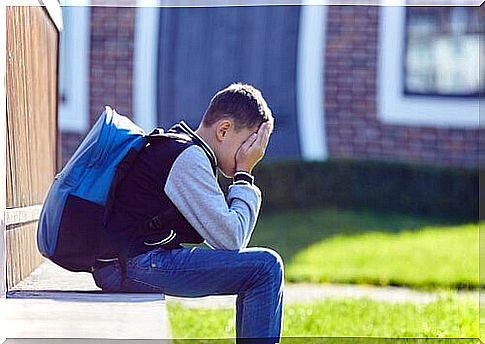How Do Students With School Anxiety View School?

How do students feel about school? This important question helps us to understand students’ attitudes towards learning. If they see school as something positive, they become self-motivated to work hard. It will also be easier to train them. On the other hand, one finds negative emotions associated with ineffective learning, rejection of school and school anxiety.
Various studies show us alarming data about students’ rejection of school. Some surveys show that between 28 and 35 percent of students do not want to go to class. These statistics show us how serious the situation is and that we need to solve this problem, since motivation is important in the learning process.
This is even more worrying if we assume that most of us, including children, have an innate motivation to acquire knowledge and self-realization. The school is an institution that in principle should be determined to meet this need. However, this is not the case, which leads us to conclude that there must be certain factors that negatively affect students’ perceptions of school.
The reasons why some students reject school
School anxiety represents the central factor that largely explains students’ rejection of school. Going to school produces a large amount of stress in students, which triggers a deviant response. This happens when the body feels that the anxiety perceived by going to school is greater than the satisfaction we get from learning and the self-realization we can feel when we go to class. We must remember that negative and short-term aspects (such as school anxiety) have greater strength than long-term positive stimuli (such as self-realization as a result of going to school).
Why do students suffer from school anxiety? To analyze this problem, it is best to change our perspective. We have to put ourselves in the shoes of a child who goes to class. If we do this, we will immediately realize that they have too long a schedule, high performance, boring classes and little motivation.

School plan
Children get up every morning from Monday to Friday to be at school for 6 to 8 hours. In addition to this, they have to complete a series of homework every day when they get home. This takes another 2 to 4 hours. And if they want to pass their exams, they have to study for about an hour a day.
If we add all this up, we get about 50 to 65 hours per week, much longer than a legal work week. In addition, many parents occupy the rest of their time with leisure activities. This results in great anxiety due to the fact that they do not have free time. This in turn leads to a rejection of the school and everything it represents. School is not interesting to them, no matter how much it may be related to their knowledge. Leisure time is important for all children.
High pressure leads to school anxiety
Our education system uses an evaluation system that usually gives grades in the form of letters or numbers related to school performance. This is a very competitive system. Those with good grades are praised, while those with bad grades are reprimanded.
In addition, we tend to attribute these mistakes or successes to the student alone. In fact, teachers are responsible for their students.
This situation causes tension among students. They feel pressured to get the best grades in the class. They forget that their ultimate goal is to learn, assimilate knowledge and acquire the opportunity to find out information and resources. Because of this, students who do not meet performance expectations are likely to feel anxious.
Imagine a school that, instead of forcing students to pass exams, focuses on what they cannot and strengthens what they are good at. It is easy to imagine that the anxiety associated with performance will disappear. They would not have to meet high standards and would no longer see evaluations or tests as threats.
Classes based on passive learning
This factor does not directly affect school anxiety, but indirectly encourages students to reject school. If the classes are not exciting and interesting enough, they will be less motivated to learn. This means that if there is little anxiety, the student’s desire to learn will disappear.
During classes, teachers usually give lectures, and students must remember the information without asking questions. In fact, reflection is often looked down upon. Students learn superficially. This type of learning is very boring and not very motivating. It is not very different from other tasks such as remembering a list of numbers.

In order for students to be motivated to learn, the new knowledge must be relevant to them. It is achieved through active learning. We should encourage them to explore intuitive theories in order to see reality in a new way. A good education system is one that does not worry students. Since we can not force them to learn, self-realization must be the inherent motivation that leads them to complete school.









